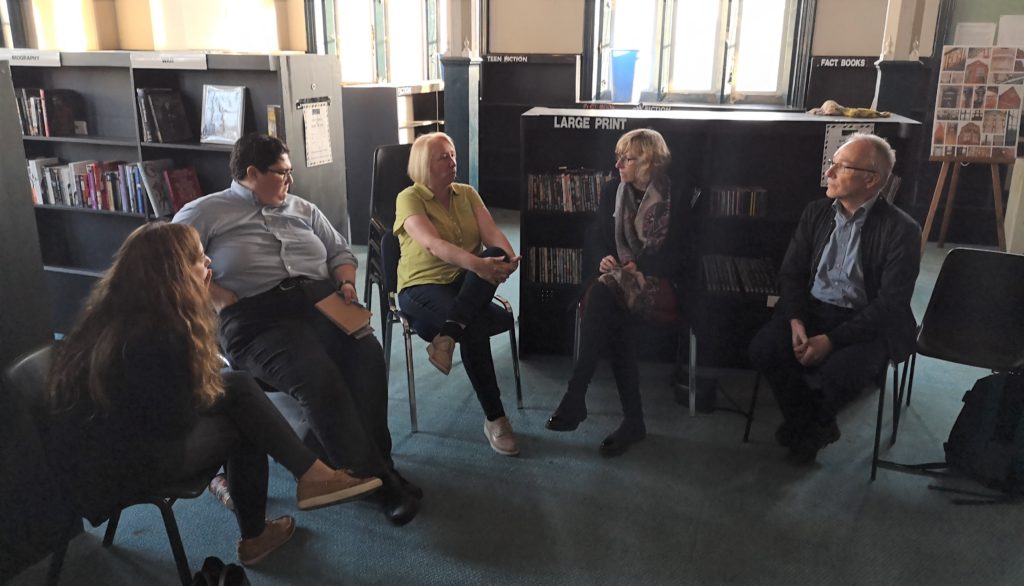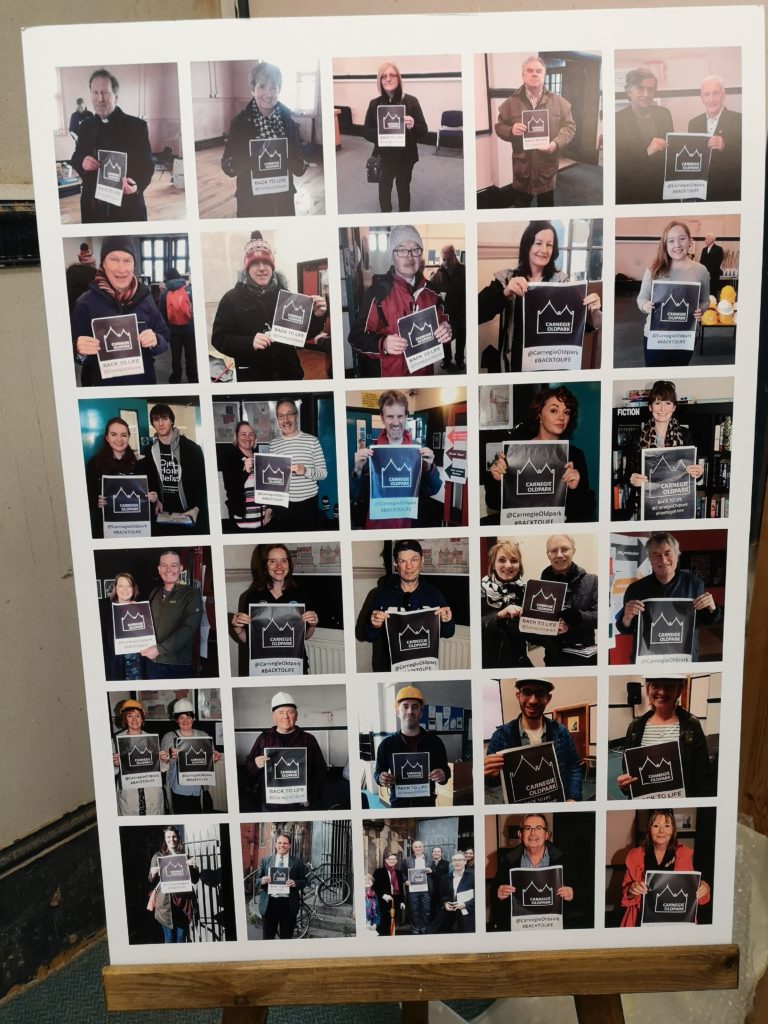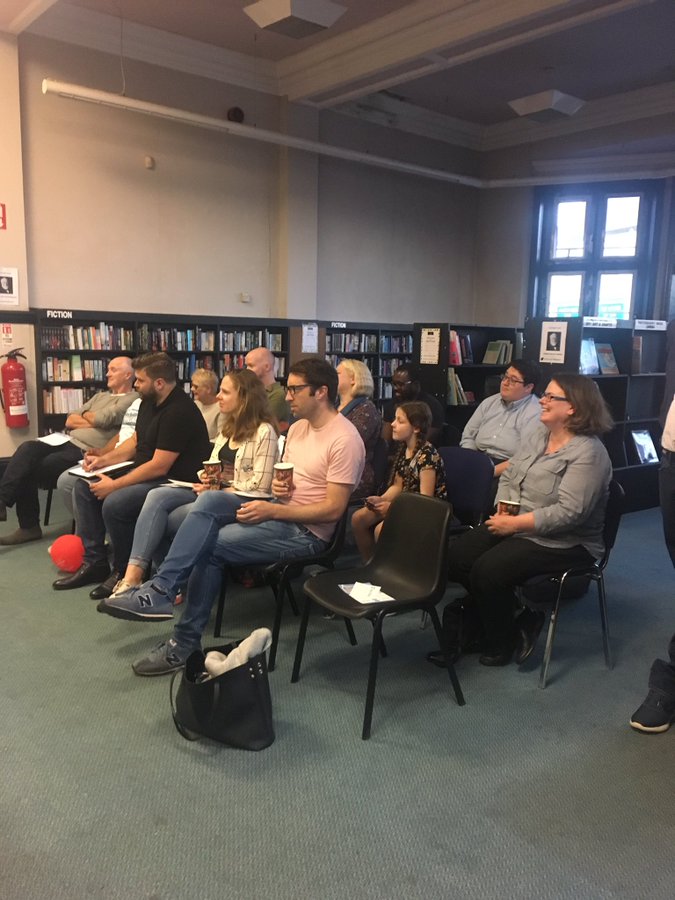This article was jointly written by Ani Kanakaki and Michael Avila. You can follow Ani on Twitter @kanakaki_ani and Michael at @AvilaMedia.
On Thursday 19 September, the historic Carnegie Oldpark Library, currently undergoing a restoration, hosted two events as part of the Good Relations Week 2019. The events – “The Story of Yes” and Refugees Welcome NI information evening – commemorated the Good Friday Agreement and informed local people of how they can better support refugees and asylum seekers in Northern Ireland respectivey. The events brought people together from a range of backgrounds in what was historically been an ‘interface’ area in north Belfast, to focus on how shared spaces, for all of our citizens, are the way of the future.
“The Story of Yes”
This included a screening of three short films produced by Belfast-based company Below the Radar, centred on the legacy of the Good Friday Agreement, with a discussion hosted by Quintin Oliver and Fiona MacMillan, organisers and architects of the Belfast Agreement’s “Yes” referendum campaign in 1998.
The first film, “54 Towns”, centred on organisers of the “54 Towns Project” which sought to gain a “Yes” vote in the 1998 referendum, in towns across Northern Ireland through the use of advert vans, posters and billboards. Coordinators of the project interviewed throughout the film displayed humility and gratitude in having played their part; one described it as “impromptu, dis-organised, but successful”. Hazel Gordon, Volunteer Coordinator of the 1998 project, summarised her motivations for campaigning for ‘Yes’ best:
“I wanted the Good Friday Agreement to work so that my children would have choices. I wasn’t sure if it was going to work at all… but I was hopeful.”
The second film, “Hope on the Border”, focused on the town of Clones, Co. Monaghan, showcased in the legendary Neil Jordan’s film, The Butcher Boy. It illustrates the realities of hardship, violence and deprivation which conflict at the border brought to communities on either side of it. The film ended on a positive note, citing how communities on both sides of the border are now thriving and building shared communities – a reality which violence had prevented in years prior.
The third film, “The Story of Yes”, was the story of the engineering of the GFA’s “Yes” campaign through the eyes of its architect, Quintin Oliver. The film explored the background to the campaign’s organisation, its strategy and tactics, and some of the setbacks, challenges and victories associated with it. In addition, it asked what the future may hold for the peace process and continued implementation of the GFA’s provisions.
Afterward, guests joined a discussion with Quintin and Fiona, much of which analysed the troubles, the campaign for “Yes”, and the films through a contemporary lens – specifically given the current political impasse at Stormont as well as the Brexit saga at Westminster
There was plenty of praise for their achievements amongst the audience, yet Quintin and Fiona were quick to point out that there is still much to be done through the GFA. They expressed regret ending the campaign the moment a ‘Yes’ vote was achieved, citing that this was actually only the beginning of peace; more positive work could have continued after to enhance the peace process. Quintin recalled that organisers were so busy trying to get to “Yes” that, at the time, they barely had a chance to sit down and read the Belfast Agreement itself. Quintin added:
“When you actually sit down and read the GFA, there is so much in it – so much that it provides for that we haven’t been able to do yet. I hope we still have these opportunities and cease them.”

Refugees Welcome NI information evening
This informative evening was held for people who may be interested in becoming refugee hosts, providing them with temporary housing as they adjust to their new lives in Northern Ireland. The event was hosted by Refugees Welcome NI, an organisation that provides practical support to refugees and asylum seekers – it’s partnered with Housing4All and Homeplus to address the issue of destitution experienced by members of the refugee community, and to promote the work they do to support the homeless.
The panel discussion was chaired by the Organiser of the PPR Projects Housing4All campaign, Aylisha Hogan, who was accompanied by Ryan Doherty of Homeplus NI, asylum seekers and their hosts, to discuss the experience, positivity and mutual respect that has been fostered throughout their time living together as part of the project.
Hosts exchanged stories about how they made lifelong friends and connections, not just with the individuals they hosted, but with cultures they were not previously exposed to and gained profound respect for. Guests discussed how much of a difference it made to them, even just small gestures like being provided with a warm bed and being shown basic respect and dignity.
Many refugees and asylum seekers are fully thriving members of the community now thanks to the programme and, often, after the positive experience of hosting a guest, many hosts open up their guest rooms again and again for incoming refugees and asylum seekers. Hosts and guests agreed that the project is mutually beneficial, having came out of it better and richer individuals with more positive futures.
If you’re interested in helping those in need and have some extra space, you can find out more about this project here.


The future for Carnegie Oldpark
The Carnegie Oldpark Library – which has previously featured on Northern Slant’s Northern Lens series – was one of nearly three hundred libraries donated by famous Scots-Irish-American, Andrew Carnegie, across the island of Ireland over a century ago. Closed nearly 16 years ago, Carnegie Oldpark was recently purchased by Quintin Oliver and Fiona MacMillan with the goal of restoring the premises and rejuvenating the Oldpark area by establishing a social enterprise and an inclusive community space on the property.
As funds accumulate and the building is restored piece by piece, the Northern Ireland Foundation, in partnership with the Lower Oldpark Community Assocation (LOCA), will continue to host cultural, heritage and community events.
You can find out more about @CarnegieOldpark on Twitter or via Facebook.
